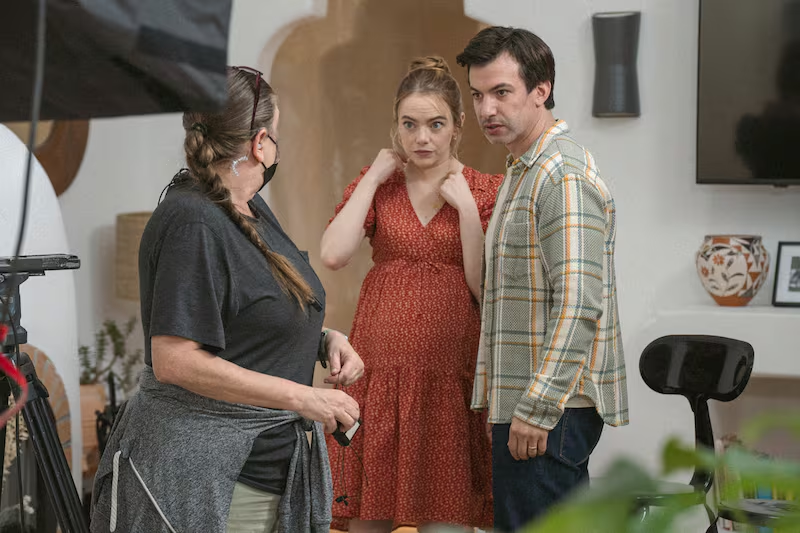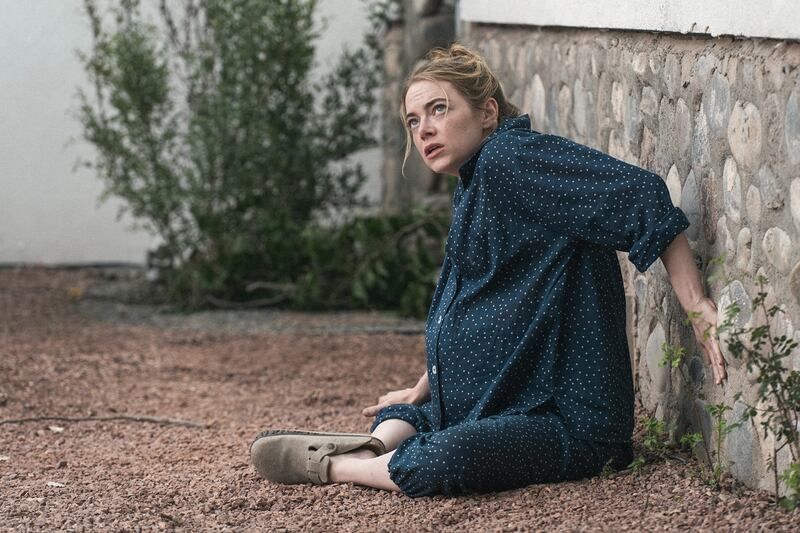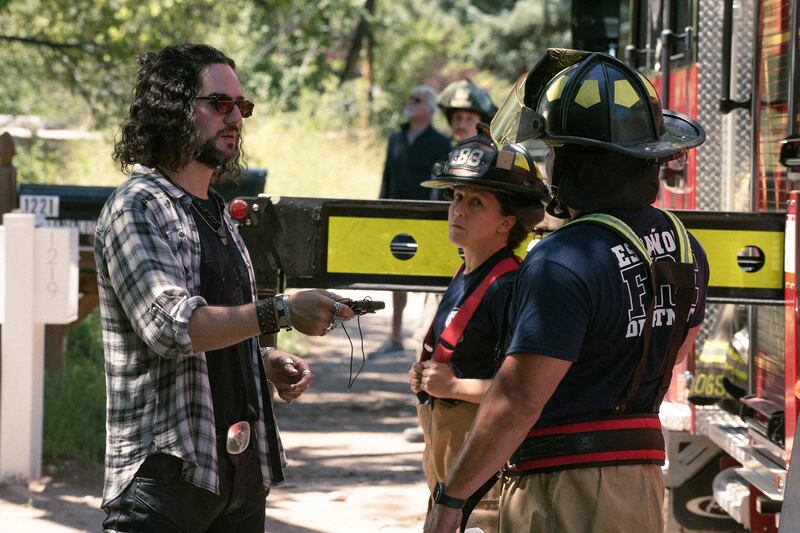Now that’s how you end a television series.
The Curse came to a close with a WTF for the ages, wrapping up its saga of reality-TV ambition and exploitation, personal and professional duplicitousness and scheming, and marital dysfunction and strife with a finale that was nothing short of out of this world. Inspiring gasps, head-scratches and incredulous exclamations in equal measure, it was a turn of events that no one on the planet saw coming. It’s a finale that proved to be a fittingly mysterious and unnerving way to conclude a story rooted in the fraught interplay between the internal and the external. A jaw-dropper of wildly absurdist proportions, The Curse’s final installment stunned and amazed with a bravura showmanship that solidified the limited affair’s standing as 2023’s best series.
[Warning: Spoilers for The Curse follow.]
The Curse’s 10th episode ultimately finds everyone becoming or revealing their true selves—a process directly related to the secret thoughts and desires they’ve worked so hard to conceal from themselves and each other. At least initially, though, it coasts along on its established weirdo wavelength, beginning with Whitney (Emma Stone) and Asher (Nathan Fielder) suffering humiliation as they’re largely ignored during their remote-video appearance on Rachael Ray’s Rachael, taking a backseat to in-studio guest Vincent Pastore as he cooks meatballs, flirts with Rachael, and sings terribly. It’s an amusing slight for the celebrity-hungry couple, even if the scene’s main target of ridicule seems to be Rachael, whose cheery and randy on-screen demeanor is precisely the sort of nails-on-a-chalkboard insincerity that Fielder and co-creator Benny Safdie’s series has mocked for its entirety.
At a subsequent shabbat dinner, Asher and now-pregnant Whitney engage in clumsy chitchat about Indigenous artist Cara (Nizhonniya Austin) and the Holocaust, highlighted by Asher losing the thread while referencing The Producers and then inadvertently foreshadowing what’s to come by stating, “art is about…I mean, sometimes you have to go to extreme lengths to make your point.” Extreme lengths are definitely on the way—yet first, the duo visit Abshir (Barkhad Abdi) to inform him that they’re giving him his house. Asher has devised this benevolent gesture as a gift to Whitney, whom he hilariously describes as “not a material person,” and Whitney has accepted it because there’s nothing she loves more than being seen by others as generous, compassionate, and tolerant. She’s the queen not of green (per her TV title), but of narcissistic virtue-signaling, and The Curse once more cuts her off at the knees by having Abshir respond ungratefully to this offer. It then takes another shot at them via their installation of an air-conditioning unit for their nursery, which confirms both that their passive home is unfit for infants, and that (following fights with buyers about stove and AC renovations) they’re unbelievable hypocrites.
The Curse’s last calm moment involves a long, slow zoom into a close-up of Whitney as she lies in bed with Asher, who’s shining a light on her pregnant belly and singing in Hebrew to their unborn child. No matter her wan smile, there’s something dark and disgusted in her eyes, and the next morning, she wakes to an incomprehensible sight: Asher sleeping on the ceiling. Confusion swiftly gives way to panic and terror as they try to get him down and determine the cause of these circumstances, which they initially blame on the passive home’s “thermos”-like pressurization. Nonetheless, opening doors and windows, and avoiding dangerous “air pockets,” do little to rectify the situation. Nor does having Whitney stay outside or crawl around on the floor in order to get Asher a Dyson vacuum cleaner to reach her nightstand cellphone. For inexplicable reasons, Asher is stuck falling upward. And if that condition weren’t harrowing enough, Whitney simultaneously goes into labor.
As with all its uncomfortable strangeness, The Curse orchestrates this with a patience that begets ominousness, gazing with unbroken fascination at Asher as he moves about the ceiling, climbing through doorways and swinging on doors in a vain effort to touch ground. Humor and horror become one, and they escalate as Asher relocates to the house’s entrance overhang and discovers that the structure isn’t to blame for his state of affairs. Courtesy of a failed attempt to pull him down by Whitney’s doula, who’s arrived on the scene to be her driver, Asher winds up in a giant tree, hugging a branch. Whitney departs for the hospital, where she delivers a baby boy by C-section, and Asher is tended to by a fire department that thinks his fear of floating away (and demanding that they use an anchored net to get him down) is nonsense. That sentiment is shared by his friend and producer Dougie (Safdie), who interprets Asher’s predicament as a manifestation of his impending-parenthood anxieties. Naturally, he conspires to record Asher with a microphone and drone camera.

Emma Stone and Nathan Fielder.
Jeff Neumann/A24/Paramount+/ShowtimeThen the chainsaw comes out, the branch to which Asher is clinging is cut, and it plummets to the inflatable pad below while Asher takes off into the stratosphere, screaming madly until a loss of oxygen causes him to lose consciousness, his body floating into the dark, twinkling void of space. Below, everyone tries to make heads or tails of what they think they’ve witnessed, and Dougie weeps uncontrollably.
To say this is an unexpected finish is the understatement of all understatements, and The Curse offers no straightforward answers. Still, there’s a bonkers method to its madness, and the key to grasping it, it seems, is by revisiting the end of the prior episode. Having watched Whitney’s honest interviews about her marital dissatisfaction, Asher confesses that he’s a “liar” and a “terrible person,” and that he, rather than any curse, is the cause of their problems. Moreover, despite Whitney clearly rejecting him, he refuses to abandon her, and in the comment that appears to instigate the finale’s anti-gravity craziness, he asserts, “I know you baby. And if you didn’t want to be with me, and I actually truly felt that, I’d be gone. You wouldn’t have to say that. I would feel it and I would disappear.”

Emma Stone.
Jeff Neumann/A24/Paramount+/ShowtimeIn the moment, this sounds like just another of Asher’s cocky-yet-sniveling declarations of spousal devotion, and Whitney’s ensuing tears come from her despondent realization that—despite disliking Asher—she’s an egomaniac powerless to resist such undying adoration. Given what transpires, however, Asher’s pronouncement comes to resemble something more monumental: Asher cursing himself by giving Whitney the ability to make him vanish by simply wishing (inside, without articulating it) to not be together anymore. The Curse has already repeatedly illustrated that Nala’s (Hikmah Warsame) tiny curses work, and Asher’s curse becomes real in the nighttime scene that directly precedes his on-the-ceiling morning ordeal, when—while singing and shining a light on her belly—Whitney stares at him with vacant, detached displeasure. It’s a look that says she’s thinking about not wanting him around as a marital or parental partner, and the next morning, her wish comes true—except that the passive home’s ceiling has impeded Asher’s magical departure.

Benny Safdie.
Richard Foreman Jr./A24/Paramount+/ShowtimeIn the finale’s home stretch, The Curse fulfills the promise of its prior suggestions, be it Dougie (in episode 8) asking Asher what he’d do if Whitney left and turned his world “upside-down,” to which Asher replies that he’d become “nothing,” or the proceedings’ habitual depiction of Asher—such as in the doctor’s office or the comedy class—as an infant, which peaks with Asher telling Whitney from the tree to concentrate on the baby in her belly and “not the baby in this tree.” In what can be seen as a hilariously demented riff on 2001: A Space Odyssey, The Curse transforms Asher into a literal Star Child, curled up in a fetal position and floating above Earth, a figure of cosmic insubstantiality and immaturity. He’s finally achieved his authentic form, and the same can be said about Whitney, whose last stare into the camera from the delivery table indicates that she has what she always coveted (i.e., independence from Asher and a baby that’s truly hers), as well as Dougie, whose breakdown speaks to the crushing guilt he’s been carrying around for the entire series.
In that regard, The Curse’s finale is the culmination of a build-up toward irrepressible self-actualization for all three of its protagonists, albeit in a surreally sinister and ambiguous fashion that would make David Lynch proud. Having painted a caustic portrait of two-faced phonies who mask their genuine thoughts and feelings behind bullshit smiles and proclamations of liberal allyship, it tears down those facades via unreal insanity in its closing episode, exposing Whitney, Asher, and Dougie for the woman and men they always were, and diligently tried to hide. As both satire and character study, it takes no prisoners. And as a bizarro nightmare about the power of dreams, greed, curses and spousal antipathy, it beguiles and astonishes like few recent big- or small-screen works.






